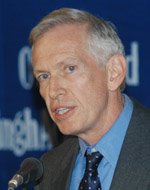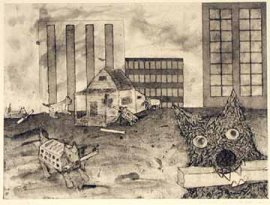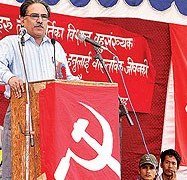 So we Nepalis are evenly split over the relevance of the monarchy. Since the opinion poll was conducted by the U.S. National Democratic Institute, we probably don’t have to denounce the findings as the handiwork of regressive forces. (Unless, of course, you want to include the NDI and by implication the United States as part of a vast right-wing conspiracy to retain the Nepalese monarchy against the spirit of the April Uprising.) What makes the monarchy, in its weakest state ever, face a nation so evenly divided? Of course, any pollster would tell you how the inflection and demeanor of the person asking the question affect the response. Moreover, our traditional predisposition to playing it safe would encourage fence-sitting at this juncture. Still, one can’t help asking a couple of questions. Has the man calumnied by two generations of critics, repudiated into seeming irrelevance after the April Uprising, redeemed himself in the eyes of the respondents?
So we Nepalis are evenly split over the relevance of the monarchy. Since the opinion poll was conducted by the U.S. National Democratic Institute, we probably don’t have to denounce the findings as the handiwork of regressive forces. (Unless, of course, you want to include the NDI and by implication the United States as part of a vast right-wing conspiracy to retain the Nepalese monarchy against the spirit of the April Uprising.) What makes the monarchy, in its weakest state ever, face a nation so evenly divided? Of course, any pollster would tell you how the inflection and demeanor of the person asking the question affect the response. Moreover, our traditional predisposition to playing it safe would encourage fence-sitting at this juncture. Still, one can’t help asking a couple of questions. Has the man calumnied by two generations of critics, repudiated into seeming irrelevance after the April Uprising, redeemed himself in the eyes of the respondents?On the other hand, were the survey participants skewed – deliberately or otherwise – heavily in favor of the palace on account of class, ethnicity or outlook? And look at the way the question was framed. A whole new coalition of Prime Minister Girija Prasad Koirala’s ceremonial monarchists and Kamal Thapa-led active monarchists has been inaugurated.
Or do Nepalis have the ability to make a distinction between the monarchy and the man on the throne? (How comforting it is to know there is always someone to take care of things should the parties and Maoist rebels botch it again and then endure spasms of mass revulsion?)
In the fickleness of our political terrain, even the Maoists recognize the value the palace would represent once the rebels are made to part with their weapons. (Could the Maoists’ public posturing over the status of monarchy be a cover for the consummation of their alliance with the Chinese and the rightward realignment that would imply?)
How soon elections to a constituent assembly are announced would perhaps depend on how fast the Seven Party Alliance (SPA) and the Maoists agree on the “status” of the monarchy. From recent pronouncements, the Maoists appear to have climbed down from their demand for an outright abolition to a suspension during the interim. The SPA constituents will probably have a response in time for the summit. And the referendum on the monarchy to go together with the assembly polls? You don’t have to be a royalist to expect, given the current state of affairs, the palace, the numbers to improve in favor of the palace.
Actually one royalist is moving in the other direction. Pashupati Shamsher Rana, president of the Rastriya Prajatantra Party (RPP), announced that his party is no longer in favor of the monarchy. The head of a party that finds itself in the revived legislature but not part of the ruling establishment, Rana hasn’t complained of having been misquoted.
Nor have RPP leaders of enough standing shown any urgency toward dissociating themselves from Rana’s statement.
Is the erstwhile royalist party on the verge of a radical policy shift? Or is the grandson of the last Rana prime minister taking the ultimate revenge on the monarchy for its role in overthrowing the oligarchy?




